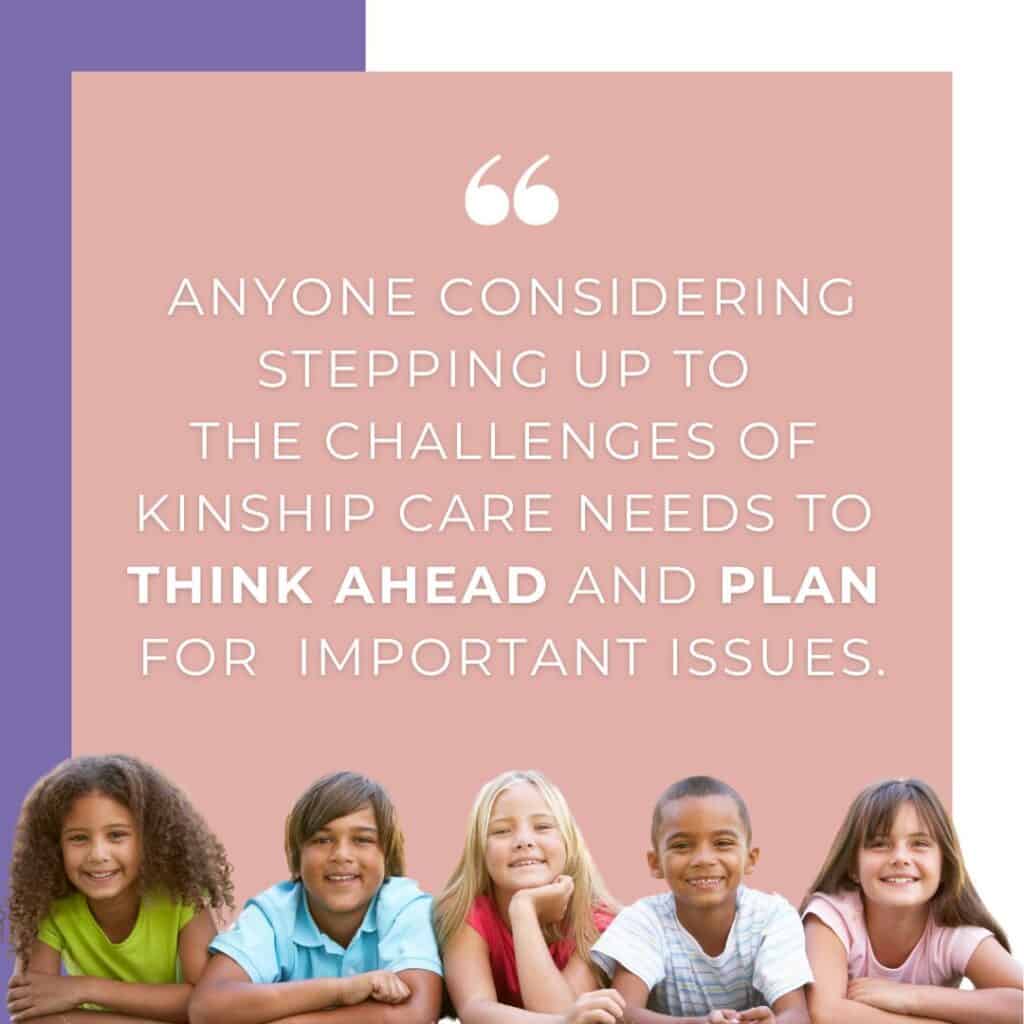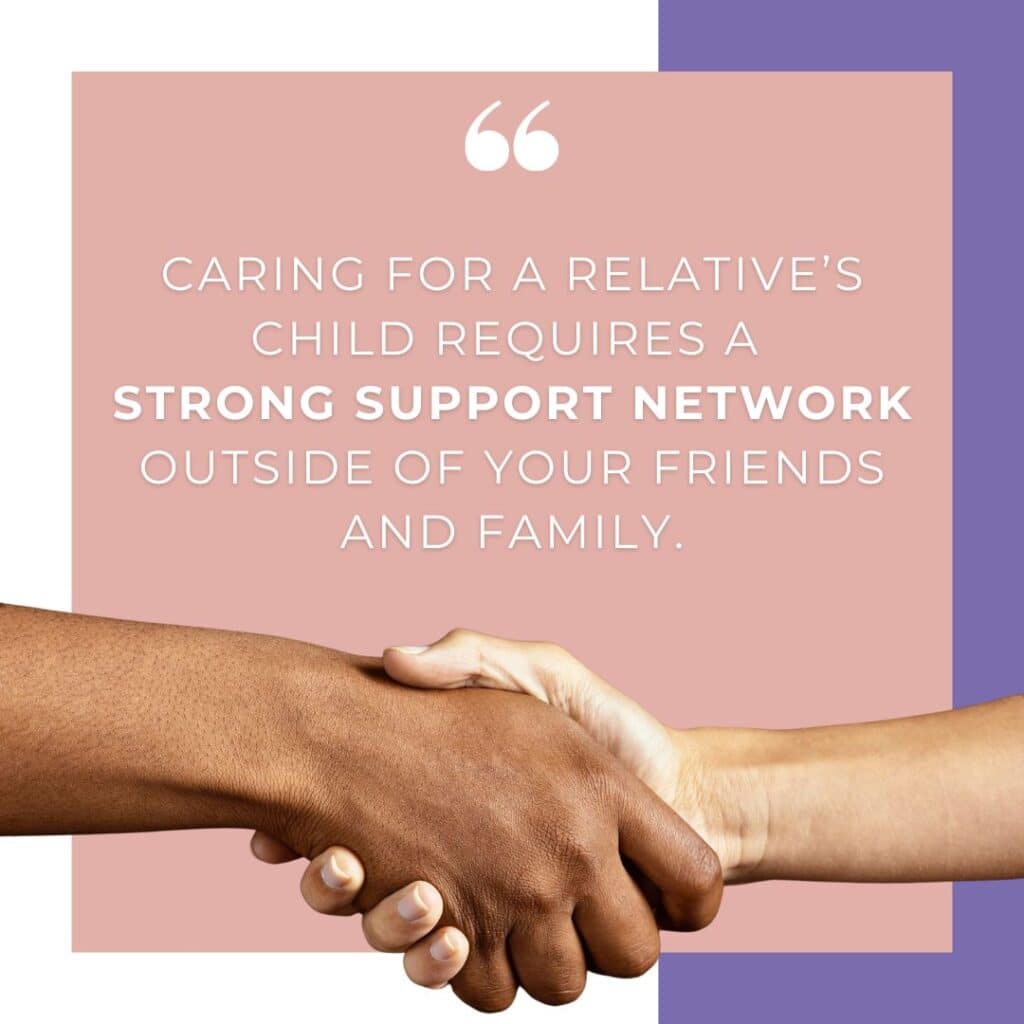A fast-growing area of foster care policy is “kinship care,” when extended family members step up to take care of children at risk of going into the system. Part of the boom in kinship care is because official federal policy encourages states to find kinship placements before they turn to foster care. Another reason is the skyrocketing rates of drug and alcohol dependence.
Kinship Care
It was the latter tragedy that pushed one of the authors of this article into kinship care. One of Debbie’s former foster children spiraled into addiction, and she and her husband inherited a foster grandchild. They learned first-hand that anyone considering stepping up to the challenges of raising another family member’s child needs to think ahead and plan for some important issues.

1. Legal Considerations of Kinship Care
First, you need to know what the laws in your state are about kinship care. The vast majority of states have two avenues available. The first is some form of guardianship. The second is kinship placement through the state’s foster care agency.
In most states, guardianship is handled solely between family members, with varying degrees of court involvement. Georgia, for example, allows a transfer of guardianship for school purposes that requires no court order. A biological parent can simply sign a form authorizing a grandparent or other family member to enroll a child in school and make education-related decisions. The arrangement is valid until the biological parent rescinds it in writing.
Permanent Arrangements
More permanent arrangements do require a court order. The process can be cumbersome, such as scheduling a court hearing and giving notice to biological parents. Some states may have laws requiring the court to appoint a guardian ad litem to review the proposed arrangement on behalf of the child. Most courts try to make the process clear enough that when parents and guardians are in agreement, you will not need an attorney.
The benefit to guardianships is that you do not need approval or supervision from any state agency. The downside is that you do not receive any foster care funds to help care for your child. Your child may qualify for disability or Social Security payments, but in most cases, the only available money flows through state foster care agencies.
For that reason, many people opt for the second arrangement, being approved as a kinship foster care placement. Of course, if a child is already in foster care, then an official kinship placement will be your only option. Your state may impose the same supervision requirements as regular foster placements, including approving vacations or even prohibiting overnight stays with friends. The trend is to give kinship care placements much more discretion, but not all states have caught up with the times.
Either guardianship or kinship foster placement will get you to the same place – having a child in your home with some unique challenges that need creative solutions.
2. Financial Considerations
Raising a relative’s child is always an expensive proposition. Any experienced foster parent will agree that even if the state offers a stipend, it is never enough to cover the costs. Currently, the biggest shortfall in government assistance is in mental health care. Children who have lived through the disruption of their biological families, and no telling how many placements since then, are likely to come to your home with significant trauma histories. You will need help from a mental health professional experienced in trauma-informed therapy. So, in addition to the normal costs of funding a child’s food, clothes, education, and extracurricular activities, plan a medical budget that includes professional counseling.
Realize that you may need financial help beyond a foster care stipend. Most of us who help other people do not like to ask for help, but in this instance, we may need to let our family and friends help share the load. You don’t have to ask for money; in fact, we recommend that you avoid that. When someone asks you how they can help, ask them to pay for a child’s band fees. Or ask them to babysit (or pay for a sitter) so you and your spouse can have a date night. Ask your church to pay for a good counselor. Raising other people’s children takes a lot of resources, and you may need to let other people help you meet that challenge.

3. Emotional Considerations of Kinship Care
Parenting a relative’s child also can be emotionally draining. You will need a strong support network beyond your usual friends and family. You will need advice from people who understand the challenges of stepping into a child’s story and building a relationship. Look for groups of foster care parents in your church or community, as they will have the most similar experiences. You will find them to be an invaluable source of experience and suggestions. Finding your people will be one of the most important things you can do to prepare for a new placement.
Also, don’t be surprised when a new placement places stress on your existing family relationships. We say “when” because it’s inevitable that children with trauma will bring their trauma with them. No matter how wonderful your home is, it will take them time to learn to trust you and feel safe. Until then (and even after), all of you will be on a roller coaster of emotions.
Put in place resources to protect and support your existing relationships. For example, don’t leave your marriage on auto-pilot in the urgency of helping your newest family members. Your marriage is the foundation of your family, so be intentional about keeping it strong. Then, use its strength to build relationships with the rest of your family.
4. Relationships With Biological Family
In the midst of building new relationships with your young relatives, remember that most of them still need and want to stay in touch with their biological parents. Children are hard-wired to want an intact biological family, and your family, no matter how wonderful, will feel off-kilter to them. So remember that what our kids need from us is to help them have as positive a relationship with their parents as they can and as they want to have.
Of course, you have to follow court orders and establish boundaries to keep the children safe. But within those limits, do what you can to encourage a relationship between your children and their parents. Follow your kids’ lead, and don’t push them beyond their comfort zone. But be ready to support them in whatever safe relationship they want to have.

One absolute rule you need to follow is never to say anything your kids can construe as criticism of their parents. You may have to walk a fine line in helping kids understand the problems that their parents are dealing with, but you need to always be as positive as you honestly can be about their parents.
Supporting your kids’ relationship with their parents will be particularly important if yours is a temporary placement while the parents work on a parenting plan or other issues. These temporary placements can be hard on us because it does not come naturally to invest a lot of ourselves into people who aren’t permanent in our lives. Even temporary placements, however, need our unconditional commitment and wholehearted support. For whatever time God had placed these children in our lives, we need to give them the love and support they need to have a chance at an abundant life.




















